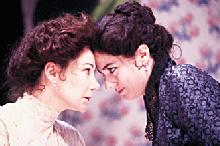SEARCH CurtainUp
REVIEWS
FEATURES
NEWS (Etcetera)
ADDRESS BOOKS
Broadway
Off-Broadway
BOOKS and CDs
OTHER PLACES
Berkshires
London
Los Angeles
Philadelphia
Elsewhere
QUOTES
On TKTS
LETTERS TO EDITOR
FILM
LINKS
MISCELLANEOUS
Free Updates
Masthead
NYC Weather
A CurtainUp  Review
Review
 Review
ReviewBoston Marriage
|
Every note you strike is false. I cannot assemble them into a rational composition. You're like a piano so bad out of tune that the choice of any note is arbitrary. How can one respect you? -- Claire |

Zoë Wanamaker and Anna Chancellor (Photo: John Haynes)
|
David Mamet's play Boston Marriage is the juxtaposition of women in late nineteenth, decorous society with explicit, modern and sometimes sexual language. The plot is less important than the expression of the sexual desires and material needs of these women. The effect is sometimes shocking, but more often, blisteringly witty. The whole, just ninety minutes, is delivered at a galloping pace.
The term "Boston Marriage" described New England women, often intellectuals and/or feminists, who lived together without men. They either had independent income or careers of their own. Whether their relationships were sexual or not, they were certainly dependent on each other for emotional support.
The women who were thus focussed on each other instead of men are familiar to readers of the novels of Henry James, less likely to be found in a play by David Mamet -- yet here we have Mamet's Anna and Claire. They are more outspoken than James' women but have some of the same problems as their counterparts in James' refined stories. In this case, they are not women of independent means and therefore need a benefactor.
That brings us to Anna's male friend who will support her in return for sexual favours. He has given her a very valuable emerald necklace which turns out to belong to the mother of a young girl Claire, wishes to seduce (with Anna as a chaperon). A scandal ensues and Anna uses the financial crisis to ensure Claire's loyalty to her.
In true Mamet fashion, Claire and Anna lacerate each other verbally. There are lashings of irony and sarcasm, ribaldry and levity and it is clear that though their concern for feminine liberty does not extend to Anna's young Scottish maid, Catherine. Mamet makes this evident by making Anna repeatedly forget not only the maid's name but her nationality, lecturing her on crop rotation and the causes of the Irish Potato Famine on the assumption that she is Irish. In one such interchange the garrulous maid describes losing what she calls her "most precious possession.quot; "Your rapier wit?" suggests Claire. "No , me maidenhood"! Catherine insists plaintively.
Zoë Wanamaker is superbly in her element as the older, more devious and manipulative woman. She has a small frame, twinkling eyes and a retroussé nose which makes her look mischievous. She also has moments of melodrama as she envisages life without financial support. Due to her parentage (Sam Wanamaker was her father) she has mastered the accent but the American accent of Anna Chancellor's Claire, who seems to hold the balance of power in the "marriage", wanders somewhat. As the maid, Lyndsey Marshall is refreshingly open and honest.
The whole set has been covered in the same floral chintz fabric. The costumes are in keeping with the period. There are times that the furnishings obscure the women but this is a minor complaint in this sophisticated comedy that's packed with clever dialogue and deserves to find another London theatre to extend its run.
Readers interested in knowing more about David Mamet can check out CurtainUp's playwrights' album entry for Mamet
| BOSTON MARRIAGE
Written by David Mamet Directed by Phyllida Lloyd Starring: Zoë Wanamaker With: Anna Chancellor, Lyndsey Marshall Design: Peter McKintosh Lighting Design: Rick Fisher Sound Design: Gary Yershon Running time: 90 minutes with no interval Box Office: 020 7369 1732 Booking to 14th April 2001 Reviewed by Lizzie Loveridge based on 17th March 2001 performance at the Donmar Warehouse Earlham Street London WC2 |



